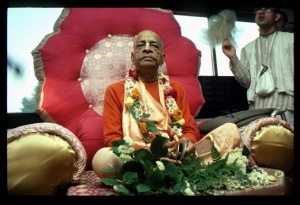SB 8.20.2

A.C. Bhaktivedanta Swami Prabhupada
TEXT 2
- śrī-balir uvāca
- satyaṁ bhagavatā proktaṁ
- dharmo 'yaṁ gṛhamedhinām
- arthaṁ kāmaṁ yaśo vṛttiṁ
- yo na bādheta karhicit
SYNONYMS
śrī-baliḥ uvāca — Bali Mahārāja said; satyam — it is truth; bhagavatā — by Your Greatness; proktam — what has already been spoken; dharmaḥ — a religious principle; ayam — that is; gṛhamedhinām — especially for the householders; artham — economic development; kāmam — sense gratification; yaśaḥ vṛttim — reputation and means of livelihood; yaḥ — which religious principle; na — not; bādheta — hinders; karhicit — at any time.
TRANSLATION
Bali Mahārāja said: As you have already stated, the principle of religion that does not hinder one's economic development, sense gratification, fame and means of livelihood is the real occupational duty of the householder. I also think that this religious principle is correct.
PURPORT
Bali Mahārāja's grave answer to Śukrācārya is meaningful. Śukrācārya stressed that one's material means of livelihood and one's material reputation, sense gratification and economic development must continue properly. To see to this is the first duty of a man who is a householder, especially one who is interested in material affairs. If a religious principle does not affect one's material condition, it is to be accepted. At the present time, in this age of Kali, this idea is extremely prominent. No one is prepared to accept any religious principle if it hampers material prosperity. Śukrācārya, being a person of this material world, did not know the principles of a devotee. A devotee is determined to serve the Supreme Personality of Godhead to His full satisfaction. Anything that hampers such determination should certainly be rejected. This is the principle of bhakti. Ānukūlyasya saṅkalpaḥ prātikūlyasya varjanam (CC Madhya 22.100). To perform devotional service, one must accept only that which is favorable and reject that which is unfavorable. Bali Mahārāja had the opportunity to contribute everything he possessed to the lotus feet of Lord Vāmanadeva, but Śukrācārya was putting forward a material argument to hamper this process of devotional service. Under the circumstances, Bali Mahārāja decided that such hindrances should certainly be avoided. In other words, he decided immediately to reject the advice of Śukrācārya and go on with his duty. Thus he gave all his possessions to Lord Vāmanadeva.